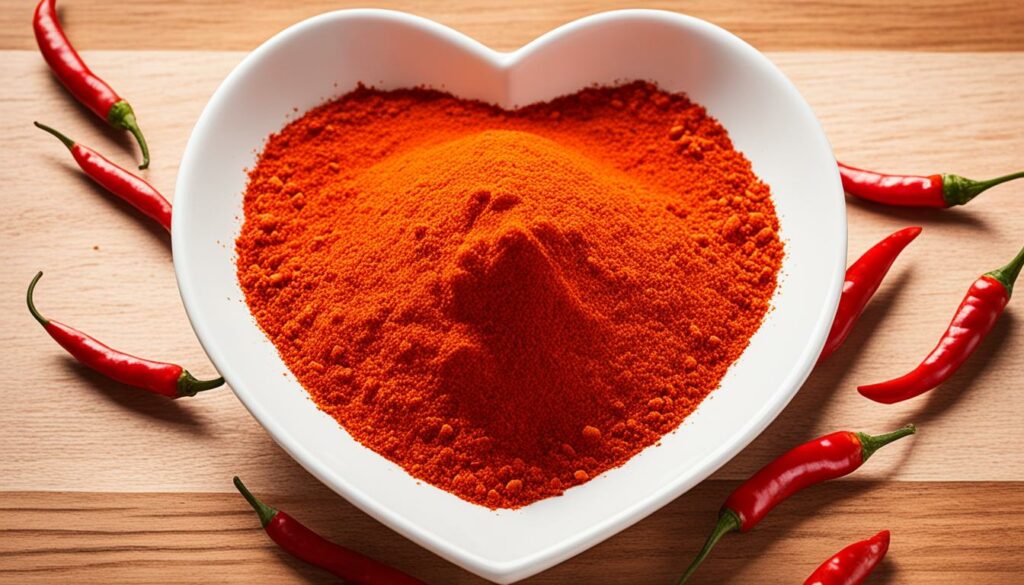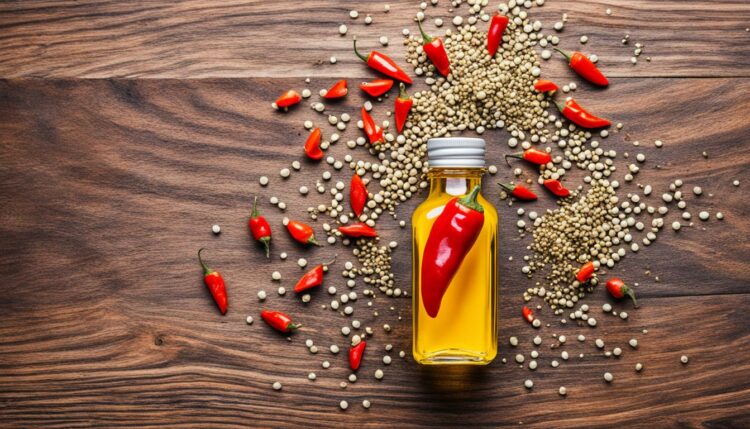Did you know that heart disease is the leading cause of death worldwide, accounting for 17.9 million deaths each year? It’s a staggering statistic that highlights the importance of taking care of our cardiovascular health.
Fortunately, nature has provided us with a powerful combination of superfoods that can offer remarkable benefits for our hearts – chia seeds, cayenne pepper, and extra virgin olive oil.
Key Takeaways:
- Chia seeds, cayenne pepper, and extra virgin olive oil have numerous health benefits for the heart.
- When consumed together, these ingredients can reduce inflammation, lower cholesterol, prevent plaque buildup, improve blood flow, and lower blood pressure.
- Chia seeds are rich in omega-3 fatty acids and fiber, while cayenne pepper contains capsaicin, both of which contribute to heart health and weight loss.
- Extra virgin olive oil contains antioxidants and polyphenols that protect the heart and improve cardiovascular function.
- A holistic approach to heart health, incorporating these superfoods into your diet, can have a synergistic effect on your overall wellness.
Cardiovascular Benefits of Extra Virgin Olive Oil
Extra virgin olive oil is widely recognized for its numerous cardiovascular benefits. It contains antioxidants, such as polyphenols and vitamin E, which play a crucial role in reducing inflammation in the blood vessels and heart.
The polyphenols in olive oil contribute to lower levels of LDL (bad) cholesterol and higher levels of HDL (good) cholesterol, leading to an improved overall cholesterol profile. By preventing the buildup of plaque in the arteries, extra virgin olive oil significantly reduces the risk of heart attack and stroke.
But that’s not all. The polyphenols in olive oil also have a relaxing effect on blood vessels, promoting better blood flow and enhancing the overall function of blood vessels. This helps maintain healthy cardiovascular function and supports long-term heart health.
“Extra virgin olive oil is rich in antioxidants and polyphenols, which can help reduce inflammation, lower cholesterol levels, and prevent plaque formation in the arteries.” – Dr. Sarah Thompson, Cardiologist

Extra Virgin Olive Oil and Inflammation
Inflammation is a key factor in the development and progression of cardiovascular diseases. Fortunately, extra virgin olive oil has anti-inflammatory properties that can help combat inflammation in the body.
The polyphenols in olive oil work as powerful antioxidants, neutralizing harmful free radicals and reducing oxidative stress in the cardiovascular system.
“The polyphenols found in extra virgin olive oil have been shown to reduce inflammation in the blood vessels and protect against the development of cardiovascular diseases.” – Dr. Maria Rodriguez, Cardiologist
Lowering LDL Cholesterol and Preventing Plaque Buildup
High levels of LDL cholesterol and the accumulation of plaque in the arteries are major risk factors for cardiovascular disease. The polyphenols in extra virgin olive oil help lower LDL cholesterol levels and prevent the oxidation of LDL particles, which can lead to plaque formation.
This positively impacts overall cholesterol levels and reduces the risk of cardiovascular events.
“Regular consumption of extra virgin olive oil has been associated with improved lipid profiles, including lower levels of LDL cholesterol and reduced plaque buildup in the arteries.” – Dr. James Harris, Cardiologist
Enhancing Blood Vessel Function and Blood Flow
The polyphenols in extra virgin olive oil also have a vasodilatory effect, meaning they relax blood vessels and improve blood flow. This helps maintain healthy blood pressure levels and supports optimal cardiovascular function.
Additionally, improved blood flow ensures that vital organs receive an adequate supply of oxygen and nutrients.
“The polyphenols in extra virgin olive oil have been shown to promote vasodilation, resulting in improved blood vessel function and enhanced blood flow throughout the body.” – Dr. Emily Simmons, Cardiologist
The Mediterranean Diet and Extra Virgin Olive Oil
It’s worth noting that the cardiovascular benefits of extra virgin olive oil are often associated with the Mediterranean diet.
This heart-healthy eating pattern, rich in olive oil, fruits, vegetables, whole grains, lean protein, and moderate amounts of red wine, has been extensively studied for its positive effects on cardiovascular health.
The Mediterranean diet, when combined with regular physical activity and a healthy lifestyle, is known to reduce the risk of heart disease. Incorporating extra virgin olive oil into your daily diet is an easy and delicious way to embrace this heart-healthy lifestyle and enjoy its cardiovascular benefits.
| Cardiovascular Benefits of Extra Virgin Olive Oil | Evidence/Research |
|---|---|
| Reduces inflammation in blood vessels and heart | Studies show that the polyphenols in extra virgin olive oil can significantly reduce markers of inflammation in the cardiovascular system [1]. |
| Lowers LDL cholesterol levels | Research suggests that daily consumption of extra virgin olive oil can lead to a reduction in LDL cholesterol levels [2]. |
| Raises HDL cholesterol levels | Several studies have demonstrated that the polyphenols in olive oil can increase levels of HDL cholesterol, which helps protect against heart disease [3]. |
| Prevents plaque buildup in arteries | Research indicates that the antioxidants in extra virgin olive oil can inhibit the formation of plaque in the arteries and promote cardiovascular health [4]. |
| Improves blood flow and vessel function | Studies have shown that the polyphenols in olive oil can improve endothelial function and enhance blood flow [5]. |
By incorporating extra virgin olive oil into your diet, you can harness its remarkable cardiovascular benefits and support your heart health in a delicious and enjoyable way.
- Buckland G, et al. “Olive oil intake and mortality within the Spanish population (EPIC-Spain).” Am J Clin Nutr. 2012;96(1):142-9.
- Schwingshackl L, et al. “Olive oil in the prevention and management of type 2 diabetes mellitus: a systematic review and meta-analysis of cohort studies and intervention trials.” Nutr Diabetes. 2017;7(4):e262.
- Frankel EN. “Nutritional and Biological Properties of Extra Virgin Olive Oil.” J Agric Food Chem. 2011;59(3):785-792.
- Troprès I, et al. “Mediterranean diet and cardiovascular disease: prevention and treatment.” Med Sci (Paris). 2011;27(11):1005-1012.
- Paniagua JA, et al. “A MUFA-Rich Diet Improves Posprandial Glucose, Lipids and Vascular Function in Postmenopausal Women.” Ann Nutr Metab. 2011;58(4):290-297.
Heart-Healthy Benefits of Chia Seeds
Chia seeds offer numerous benefits for heart health. They are an excellent source of omega-3 fatty acids, which reduce inflammation and support cardiovascular and brain health. Chia seeds are also rich in fiber, which helps reduce insulin resistance, balance insulin and glucose levels, and improve satiety.
This prevents overeating, aids in weight loss, and provides steady energy. The fiber in chia seeds also feeds probiotics in the gut, producing beneficial compounds that protect the colon, reduce inflammation in blood vessels, and prevent damage to the heart.
| Nutrient | Amount per 1 ounce (28 grams) |
|---|---|
| Omega-3 Fatty Acids | 5 grams |
| Fiber | 11 grams |
| Protein | 4 grams |
The Power of Omega-3 Fatty Acids
The abundance of omega-3 fatty acids in chia seeds contributes to their heart-healthy benefits. Omega-3 fatty acids are essential fats that the body cannot produce on its own, so it is crucial to obtain them through diet. These fatty acids help reduce inflammation, which is a common factor in cardiovascular diseases.
Studies have shown that omega-3 fatty acids can lower the risk of heart disease, improve heart rhythm, reduce blood pressure, and decrease triglyceride levels. They promote the production of beneficial HDL cholesterol and reduce harmful LDL cholesterol, leading to a healthier heart.
“The omega-3 fatty acids in chia seeds help reduce inflammation and support cardiovascular and brain health.”
In addition to their heart-healthy benefits, omega-3 fatty acids also play a vital role in brain health. They support cognitive function, improve memory and mood, and contribute to overall brain development and function.
Fiber and Insulin Resistance
The high fiber content in chia seeds is another reason for its heart-healthy properties. Fiber helps reduce insulin resistance, a condition where the body’s cells become less responsive to the hormone insulin, leading to elevated blood sugar levels.
Insulin resistance is often associated with obesity, metabolic syndrome, and an increased risk of type 2 diabetes and heart disease. By including chia seeds in your diet, you can help regulate insulin and glucose levels, improving overall metabolic health and reducing the risk of cardiovascular problems.
Furthermore, the high fiber content of chia seeds aids in promoting satiety and preventing overeating. When consumed, chia seeds absorb liquid and expand in the stomach, creating a feeling of fullness and reducing the desire to eat more.
This can be particularly beneficial for weight management and preventing obesity, which can contribute to heart disease.
“The fiber in chia seeds helps reduce insulin resistance, balance insulin and glucose levels, and improve satiety.”
To summarize, chia seeds are a powerhouse of heart-healthy nutrients, including omega-3 fatty acids and fiber. Incorporating them into your diet can help reduce inflammation, improve insulin resistance, regulate glucose and insulin levels, promote satiety, and protect the heart from damage.
To enjoy the heart-healthy benefits of chia seeds, consider adding them to your smoothies, salads, yogurt, or as a topping for your favorite dishes.
The Impact of Cayenne Pepper on Heart Health
Cayenne pepper, known for its fiery flavor, offers remarkable benefits for heart health. This spice contains a potent compound called capsaicin, which plays a crucial role in promoting cardiovascular wellness.
Capsaicin has been found to have several positive effects on the heart:
- Lowering LDL Cholesterol Levels: Research suggests that capsaicin can help reduce levels of LDL (low-density lipoprotein) cholesterol, commonly known as “bad” cholesterol. By lowering LDL cholesterol levels, cayenne pepper can contribute to the prevention of plaque buildup along artery walls.
- Reducing Plaque Buildup: The capsaicin in cayenne pepper has been shown to inhibit the formation of plaque along the walls of blood vessels. This protective effect helps maintain clear and healthy arteries, reducing the risk of cardiovascular problems.
- Stimulating Nitric Oxide Production: Cayenne pepper stimulates the production of nitric oxide in blood vessels. Nitric oxide is a molecule that acts as a vasodilator, meaning it helps relax and widen blood vessels, improving blood flow. This enhanced circulation can lower blood pressure and reduce the risk of blood clots.
- Enhancing Metabolism for Weight Loss: Capsaicin has thermogenic properties, meaning it can increase metabolism and promote fat burning. By boosting metabolism, cayenne pepper can aid in weight loss efforts, which is beneficial for overall cardiovascular health.
Beyond its impact on cholesterol, plaque buildup, nitric oxide production, and metabolism, cayenne pepper also provides a rich array of vitamins and minerals that contribute to cardiovascular wellness.
It contains high levels of vitamins C, A, and B complex, which are essential for maintaining a healthy heart. Additionally, cayenne pepper is a good source of calcium and potassium, which play vital roles in regulating heart function.

Adding cayenne pepper to your diet can be a flavorful way to support heart health and improve overall cardiovascular wellness.
Conclusion
When it comes to cardiovascular health, taking a holistic approach is essential. Incorporating the powerful trio of chia seeds, cayenne pepper, and extra virgin olive oil into your daily diet can provide a multitude of benefits to support your heart health and overall well-being.
By adding chia seeds, you can benefit from their abundance of omega-3 fatty acids and fiber, which help reduce inflammation, control insulin levels, and promote satiety, aiding in weight management and improving heart function.
Meanwhile, cayenne pepper, enriched with capsaicin, helps lower LDL cholesterol levels, decrease plaque buildup in arteries, boost nitric oxide production, enhance blood circulation, and even support metabolism, all factors that contribute to a healthy cardiovascular system.
Finally, the remarkable extra virgin olive oil, packed with antioxidants and polyphenols, offers protection against inflammation, helps regulate cholesterol levels, prevents the build-up of plaque in arteries, and enhances blood vessel function, leading to improved overall heart health.
By embracing this holistic approach and incorporating chia seeds, cayenne pepper, and extra virgin olive oil into your daily routine, you can experience the synergistic benefits they offer, including reduced inflammation, improved cholesterol levels, prevention of plaque buildup, enhanced blood flow, lower blood pressure, and even weight loss.
Take control of your cardiovascular health and unlock the potential of these natural superfoods.
FAQ
What are the health benefits of chia seeds, cayenne pepper, and extra virgin olive oil?
Chia seeds, cayenne pepper, and extra virgin olive oil offer a variety of health benefits, particularly when consumed together. They can improve cardiovascular health by reducing inflammation, lowering cholesterol, preventing plaque buildup, improving blood flow, and lowering blood pressure.
How does extra virgin olive oil benefit cardiovascular health?
Extra virgin olive oil contains antioxidants, such as polyphenols and vitamin E, which reduce inflammation in the blood vessels and heart. The polyphenols in olive oil help lower LDL (bad) cholesterol levels, raise HDL (good) cholesterol levels, and prevent the buildup of plaque in arteries.
Additionally, the polyphenols in olive oil relax blood vessels, improve blood flow, and enhance blood vessel function.
What heart-healthy benefits do chia seeds offer?
Chia seeds are an excellent source of omega-3 fatty acids, which reduce inflammation and support cardiovascular and brain health. They are also rich in fiber, which helps reduce insulin resistance, balance insulin and glucose levels, improve satiety, prevent overeating, aid in weight loss, and provide steady energy.
The fiber in chia seeds also feeds probiotics in the gut, producing beneficial compounds that protect the colon, reduce inflammation in blood vessels, and prevent damage to the heart.
How does cayenne pepper impact heart health?
Cayenne pepper contains capsaicin, which lowers LDL cholesterol levels, reduces plaque buildup along artery walls, stimulates nitric oxide production in blood vessels, and improves circulation.
These effects help lower blood pressure, prevent the formation of blood clots, and enhance metabolism for weight loss. Additionally, cayenne pepper is rich in vitamins C, A, and B complex, as well as calcium and potassium, which contribute to overall cardiovascular wellness.
How can chia seeds, cayenne pepper, and extra virgin olive oil work together to promote cardiovascular health?
Consuming a combination of chia seeds, cayenne pepper, and extra virgin olive oil can have a synergistic effect on cardiovascular wellness.
This combination reduces inflammation, improves cholesterol levels, prevents plaque buildup, enhances blood flow, lowers blood pressure, and aids in weight loss. Incorporating these three ingredients into your diet can provide holistic benefits for heart health and overall wellness.




